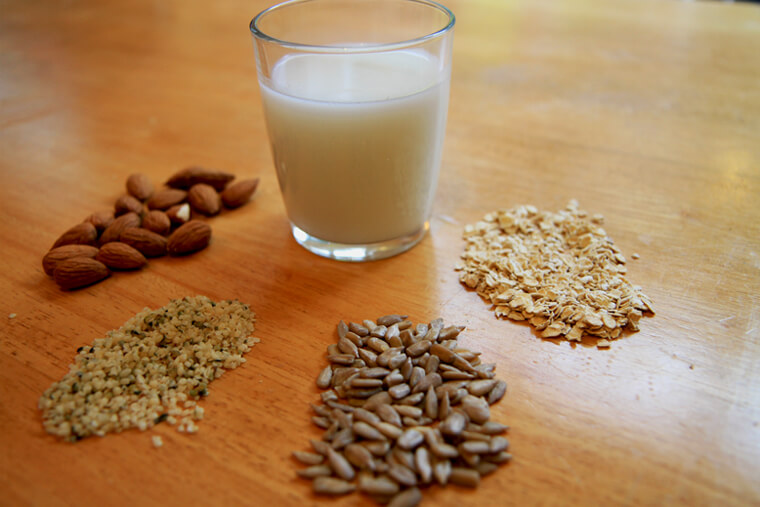Whether you’re looking for a solution to lactose intolerance, a casein allergy or just want a little variety, you’re in luck–the options in the faux milk section seem to grow daily. You can now sport a white mustache that comes from almonds, oats and even hemp. There is no need to cry over spilled milk with these animal-free dairy alternatives.
Here’s my Alternative Milk Guide:
NUT MILKS
Nut milks are exactly what they imply – dairy-free, liquid refreshment gleaned from ground nuts. Like most of the alternative milks, they’re actually very easy to make since it is just soaked nuts blended with water and strained. Try using almonds, pecans, hazelnuts, cashews, macadamia, brazil nuts, pistachios, walnuts – oh the possibilities!
Nutritional profile: Nuts are high in a number of vitamins and minerals, including vitamin E, manganese, magnesium, phosphorous, potassium, selenium, iron, fiber, zinc and calcium. The most popular nut milk, which is almond milk, is lactose, gluten, casein and cholesterol free – it’s also free of saturated fats. Clearly, nut milks cannot be consumed by someone with a nut allergy.
COCONUT MILK
This is made by pressing the coconut flesh and adding water. Another way is simply adding coconut flakes to a blender with water and blend.
Nutritional profile: Coconut milk is a very creamy, dairy-free alternative for those who are lactose intolerant or allergic to animal milk. A vegan drink, it is also soy-free, gluten-free, cholesterol-free and nut-free while its fat content is considered to a ‘good fat’, easily metabolised by the body and quickly turned into energy rather than being stored as fat. Coconut milk is also rich in lauric acid, a substance also found in human milk, which researchers have shown have anti-viral and anti-bacterial properties. Coconut milk is very low in carbohydrates and low in protein.
SEED MILKS
Seed milk is made by blending seeds with water and straining it. There are a wide range of seeds that can be used: hemp, sunflower, flax, chia, pumpkin, sesame.
Nutritional profile: A good alternative for anyone with soy and nut allergies, seed milks is are also cholesterol and lactose free, low in saturated fats and rich in healthy omega fatty acids. It’s also an excellent source of protein and tastes creamy and nutty – they tend to be a bit thicker than other plant-based milks. It may be unsuitable for people with nut or seed allergies. It is gluten-free.
OAT MILK
Oat milk is made by soaking oats in water, blending and straining it.
Nutritional profile: Like many plant milks, oat milk is cholesterol and lactose free, and also contains high levels of antioxidant vitamin E. It also contains folic acid, which is essential for most bodily functions and is needed to synthesize and repair DNA, produce healthy red blood cells and prevent anaemia. Thanks to its plant source, oat milk is usually tolerated by people with multiple allergies, and is also a good source of phytochemicals; naturally occurring chemicals in plants that help fight diseases such as cancer, heart disease and stroke. The main argument against oat milk is that it, like rice milk, is high in sugar and has low calcium and protein content. It is appropriate for those with nut allergies, but is not gluten-free.
RICE MILK
Rice milk is made by blending cooked rice with water and straining.
Nutritional profile: Rice milk is the most hypoallergenic of all the milk substitutes and is extremely nutritious. It’s also the least fattening of all the milk alternatives with only one gram of unsaturated fat per cup. There are also plenty of heart healthy nutrients in rice milk. The unsaturated fat comes from rice bran oil, which can help lower your blood cholesterol. Niacin and vitamin B6 are also good for this while the high magnesium content helps to control your blood pressure. Iron and copper increases your red blood cell production, giving you better oxygenated blood and more vitality. On the downside, since rice is highly starchy, so is rice milk. One cup of rice milk contains 33 grams of sugary carbohydrates. It also has a very low protein and calcium content, so choose the fortified product instead. It is suitable for people with nut allergies and it is gluten-free.
SOY MILK
Soy milk is made by soaking soybeans and blending them with water and straining. You can find unsweetened, sweetened, flavored and chocolate versions in markets.
Nutritional profile: Soy milk has the highest protein content of all the alternative milks and is low in carbs with a moderate amount of fat. Many soy milks contain additives, since straight soy milk doesn’t taste wonderful, so be careful of all the flavors and sweeteners added. I would encourage you to look for organic or “non-GMO” soy milk. Many people consider unfermented soy difficult to digest. In addition, soy contains the cancer-fighting isoflavones. A recent study has demonstrated that isoflavones have potent antioxidant properties, comparable to that of the well known antioxidant vitamin E. The antioxidant powers of isoflavones can reduce the long-term risk of cancer by preventing free radical damage to DNA. On the flip side, studies may show that isoflavones mimic estrogen in the body and can be disruptive to the body’s hormonal cycles. As long you use soy products in moderation, it can be a good addition to your diet. It’s also safe for the lactose intolerant and anyone with a milk allergy.
Check back later as I’ll be sharing a yummy and creative seed milk recipe with you soon!



